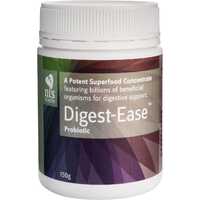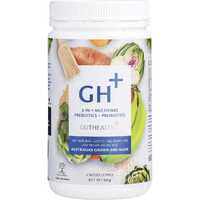The human gut plays a central role in our health and well-being. From energy regulation and immune system function to digestive and mental health, gut diversity influences every part of the body. Certain foods and supplements are known to boost healthy bacteria and improve gut health, including a variety of compounds known as probiotics and prebiotics. With roughly 100 trillion microorganisms living in the human gastrointestinal tract, a balanced gut microbiota is essential to living a long and happy life.
Let's take a close look at probiotics and prebiotics and review some of the healthiest foods and supplements that help to shape the gut microbiota.
Probiotics vs Prebiotics
If you want to have a positive influence over the health of your gut, it's important to consume the right foods. Whether you're looking for fresh ingredients or powerful supplements, understanding the difference between probiotics and prebiotics is essential before you go shopping.
What are probiotics?
Probiotics are live microorganisms taken to restore or improve gut flora. From yogurts and liquids to powders and capsules, there are many ways to consume probiotics and boost gut health. According to the World Health Organization (WHO), probiotics are 'live microorganisms which when administered in adequate amounts confer a health benefit on the host'. While the specific nature and amount of these benefits is disputed, evidence is increasingly positive.
Live probiotic cultures are an important part of fermented dairy products. The considered preparation and storage of these products can dramatically boost healthy microorganism populations. Yogurt is the best example, with some high-quality yogurt products containing a wide range of live cultures. Probiotics are also found in other fermented foods, including sauerkraut, kimchi, and kombucha tea. You can also consume probiotic-fortified foods containing live beneficial bacteria or yeast, including liquids, powders, and pills.
What are prebiotics?
Prebiotics are substances that induce the growth or activity of beneficial microorganisms. These compounds don't contain live cultures, but they influence gut health by helping to boost beneficial bacteria and fungi numbers.
Although humans can eat this fibre just fine, prebiotics are non-digestible and resistant to breakdown by stomach acid and enzymes, Instead, it's the beneficial bacteria in your gut that digest this fibre, and you benefit as a result.
When fermented by microorganisms, prebiotics can alter the composition of your microbiome. They help to stimulate the growth and activity of beneficial bacteria and improve the overall balance of the gut.
Prebiotics include plant-derived carbohydrate compounds called oligosaccharides, which are found in many vegetables as fructose molecules. Dietary fibre prebiotics also include resistant starch, pectin, beta-glucans, and xylooligosaccharides. Prebiotics are also sold as powders or pills, often together with probiotic compounds as synbiotics.
The Importance of Gut Health
From the moment we're born, our health is influenced by our gut microbiota. There are trillions of microorganisms living in your gastrointestinal tract, including millions of bacteria, viruses, fungi, and protozoa. This incredibly large and complex population includes beneficial and not-so-beneficial members, with internal balance as the key to promoting and maintaining good health. Among other things, the gut microbiome help to digest foods, generate energy, regulate the immune system, and fight disease.
There are two major groups in the human gut — Bacteroidetes and Firmicutes, which are joined by smaller numbers of Actinobacteria, Proteobacteria, Fusobacteria, and Verrucomicrobia. Bacteroidetes include Bacteroides and Prevotella, and Firmicutes include more than 200 different genera. Sometimes referred to as the 'second brain', the human gut microbiome is largely non-pathogenic and symbiotic with the surrounding environment.
How do probiotics & prebiotics affect the gut microbiome?
The human gut microbiome relies heavily on fermentation, which involves the breakdown of bacteria and yeast into sugars. Along with regular methods of promoting good health through diet and exercise, there are two active ways to promote the fermentation process and support the growth of short-chain fatty acids (SCFAs) like acetate, propionate, and butyrate:
- Probiotics can be consumed to directly boost the number of beneficial bacteria in the gut.
- Prebiotics can be taken to fuel the growth of beneficial bacteria in the gut.
What are the dangers of poor gut health?
An unbalanced gut microbiome has been associated with a wide range of physical and psychological issues. From allergies and metabolic disorders to irritable bowel syndrome and neurodevelopmental problems, the human gut plays a central role across the health spectrum. Regular biological functions such as energy regulation, metabolism, and brain function are also affected by gut health.
Special mention needs to be given to a condition known as 'leaky gut syndrome', which is a form of inflammation associated with bowel problems, allergies, obesity, mood disorders, and autoimmune diseases. When people have this condition, the gut leaks foreign substances into the blood, causing an autoimmune response that may be associated with a higher risk of disease.
The Best Way to Consume Probiotics & Prebiotics
Probiotics are live microorganisms, which are the things we normally try to avoid when eating food. This is a mistake, however, as the smallest things contribute in the biggest way to human health. Prebiotics are the non-living fibres that occur naturally in many foods, including fruits, vegetables, and whole grains.
There are lots of effective easy ways to boost your probiotic and prebiotic intake, from yogurt and other fermented foods to potions, powders, and pills. The following options are among the very best:
Yogurt
Yogurt is a much-loved probiotic food that offers various benefits related to gut health. Made from fermented milk, yogurt contains lots of lactic acid bacteria and Bifidobacteria among other microorganisms. Yogurt is known to be good for bone health, irritable bowel syndrome, and high blood pressure, among other benefits. Not all yogurt is equal, however, with many beneficial probiotics killed during food processing. If you really want to boost your microbiome, it's important to consume yogurt products that contain live or active cultures.
Kombucha
Kombucha is a fermented black or green tea drink that has become increasingly popular over recent years. Fermented with bacteria and yeast, this much-loved drink has a number of potentially beneficial probiotic properties. When fermented, kombucha contains several species of lactic-acid bacteria, including Gluconacetobacter and Lactobacillus. While the benefits of kombucha require further study, these bacteria may have important probiotic functions. Kombucha has also shown promise for heart disease and diabetes, especially when it's made from green tea.
Miso
Miso is a traditional Japanese seasoning that's often used to make soups. Made by fermenting soybeans with koji fungus, barley, rice, or rye, miso offers a real probiotic hit in a salty delicious package. Miso is a fantastic source of protein and fibre, and it's also high in beneficial plant compounds, vitamins, and minerals like manganese and copper. Along with containing nutrients, the fermentation process used to produce miso makes it easier for your body to absorb these nutrients. The main probiotic compound in miso is A. oryzae, which is believed to exert anti-tumour functions.
Other fermented foods
While the fermented foods listed above are among the most popular, there are lots of delicious gut-friendly foods. Other popular fermented foods include kefir, sauerkraut, tempeh, kimchi, pickles, natto, and traditional buttermilk. Even some cheese products have live cultures, including mozzarella, cheddar, gouda, and cottage cheese. There are many varieties of fermented vegetables, dairy products, and soybeans — all of which may help to improve gut health.
Fresh prebiotic foods
If you want to boost your prebiotic intake, natural whole foods rich in fibre are a great idea. Not all dietary fibres qualify as prebiotics, however. The following foods offer the highest amount of prebiotic inulin, fructo-oligosaccharides (FOS), and galacto-oligosaccharides (GOS):
- Dandelion greens
- Chicory root
- Garlic
- Onions
- Bananas
- Jerusalem artichokes
- Apples
- Whole oats
Health supplements
Probiotics and prebiotics are present in many foods, with the former found in fermented foods and the latter present in fruits, vegetables, and whole grains. Eating healthy food all the time can be challenging, however, especially when you're busy or life just gets in the way. Luckily, there are lots of health supplements full of beneficial probiotics and prebiotics, with options available in liquid, powder, and tablet form. Along with being simple to manage, easy to digest, and widely accessible, these products offer the perfect balance of microorganisms to help improve gut diversity and maximise health outcomes.
If you want to boost your gut health with probiotics and prebiotics, Healthy Being has lots of great foods and supplements available. So visit our website say and enjoy free shipping options across Australia and worldwide delivery!


 Certified Organic
Certified Organic Vegan Friendly
Vegan Friendly  Vegetarian
Vegetarian Organic Ingredients
Organic Ingredients Dairy Free
Dairy Free Gluten Free
Gluten Free Keto Friendly
Keto Friendly
































